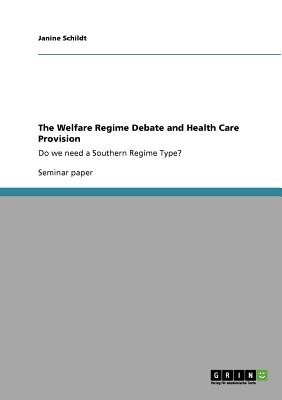
- We will send in 10–14 business days.
- Author: Janine Schildt
- Publisher: GRIN Verlag
- ISBN-10: 3640731239
- ISBN-13: 9783640731237
- Format: 14.8 x 21 x 0.4 cm, softcover
- Language: English
- SAVE -10% with code: EXTRA
The Welfare Regime Debate and Health Care Provision (e-book) (used book) | bookbook.eu
Reviews
Description
Seminar paper from the year 2010 in the subject Politics - Political Theory and the History of Ideas Journal, grade: 1,7, Hertie School of Governance, language: English, abstract: The welfare regime typology of the Danish sociologist Gøesta Esping-Andersen has become a modern social science classic and is widely used as a theoretical foundation for all kinds of research projects. However, his three-folded model differentiating regimes on the basis of welfare provision has also been challenged. Many studies have criticized Esping-Andersen for his non-acknowledgement of a Southern welfare regime including Greece, Spain, Portugal and Italy (...). Historic circumstances have produced fragmented welfare states which provide partly extensive state-led services, e.g. in health care, but have very limited benefits in other areas. The question remains whether "the peculiarities of these cases are variations within a distinct overall logic [or] a wholly different logic per se", as Esping-Andersen (1999, p.90) has formulated it. Claire Bamba (2005) has challenged Esping-Andersen's welfare regime typology focusing on health care and identified two additional subcategories. Bamba argued that health care provision is a very distinguished feature of the welfare state and countries may follow a different logic in their health care services than they pursue in other branches of their welfare states (...). This paper argues that Southern countries can be included in Esping-Andersen's typology when looking at welfare areas independently and thus do not form an independent regime. The only clear difference they show is that their health care services and other areas of welfare state support follow different logics, which is also true for other countries such as the United Kingdom. Moreover, following Katrougalos (1996) it is argued that the distinctive features of Southern countries are based on the incompleteness of the development of their welfare states which have undergone consid
EXTRA 10 % discount with code: EXTRA
The promotion ends in 17d.20:42:47
The discount code is valid when purchasing from 10 €. Discounts do not stack.
- Author: Janine Schildt
- Publisher: GRIN Verlag
- ISBN-10: 3640731239
- ISBN-13: 9783640731237
- Format: 14.8 x 21 x 0.4 cm, softcover
- Language: English English
Seminar paper from the year 2010 in the subject Politics - Political Theory and the History of Ideas Journal, grade: 1,7, Hertie School of Governance, language: English, abstract: The welfare regime typology of the Danish sociologist Gøesta Esping-Andersen has become a modern social science classic and is widely used as a theoretical foundation for all kinds of research projects. However, his three-folded model differentiating regimes on the basis of welfare provision has also been challenged. Many studies have criticized Esping-Andersen for his non-acknowledgement of a Southern welfare regime including Greece, Spain, Portugal and Italy (...). Historic circumstances have produced fragmented welfare states which provide partly extensive state-led services, e.g. in health care, but have very limited benefits in other areas. The question remains whether "the peculiarities of these cases are variations within a distinct overall logic [or] a wholly different logic per se", as Esping-Andersen (1999, p.90) has formulated it. Claire Bamba (2005) has challenged Esping-Andersen's welfare regime typology focusing on health care and identified two additional subcategories. Bamba argued that health care provision is a very distinguished feature of the welfare state and countries may follow a different logic in their health care services than they pursue in other branches of their welfare states (...). This paper argues that Southern countries can be included in Esping-Andersen's typology when looking at welfare areas independently and thus do not form an independent regime. The only clear difference they show is that their health care services and other areas of welfare state support follow different logics, which is also true for other countries such as the United Kingdom. Moreover, following Katrougalos (1996) it is argued that the distinctive features of Southern countries are based on the incompleteness of the development of their welfare states which have undergone consid


Reviews